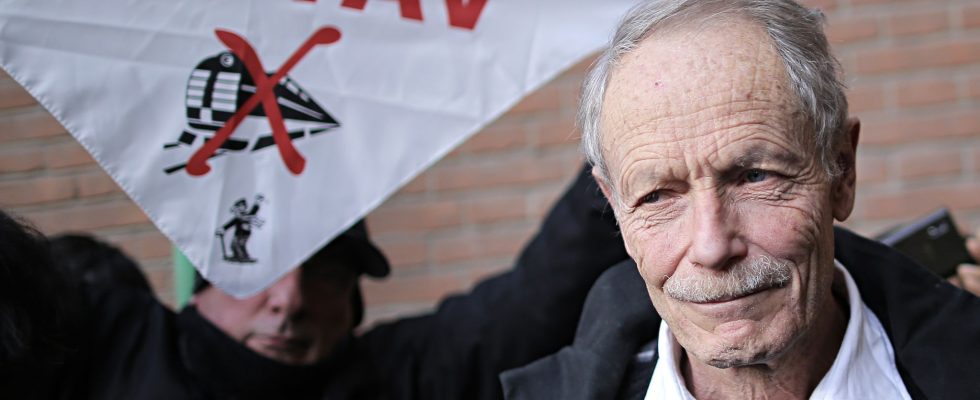It is a movement that has been fighting since 1991 against the Lyon-Turin high-speed rail line project. Nicknamed “No Tav”, from the acronym TAV (Treno alta velocita in Italian, the equivalent of the French TGV), these opponents consider that this project is too polluting and too expensive. They demonstrate Saturday, June 17 in the Maurienne Valley.
The demonstration, announced for a long time by a dozen organizations including the Uprisings of the Earth, a movement which Gérald Darmanin had evoked his wish to dissolve last March, intends to denounce the ecological impacts, in particular on water resources, of this “titanic railway project, involving the drilling of 260 kilometers of galleries through the Alpine massifs”.
Several decades old, the LGV Lyon-Turin project aims to reduce the transport of goods by truck in favor of rail and to halve the travel time for passengers, by putting Turin two hours from Lyon.
A demonstration banned by the prefecture
During the night of Thursday to Friday, the prefecture of Savoie issued a ban “on any demonstration or gathering on the public highway” from Friday June 16 to Sunday June 18 in nine municipalities of Maurienne “in order to ensure safety people and property”. The prefecture expects more than 3,000 people, “including more than 400 radicals”.
The Grenoble administrative court is considering this Friday afternoon the appeals filed by opponents of this high-speed rail line construction site. Mandated by EELV, Attac and the local association “Vivre en Maurienne”, the lawyer Arié Alimi filed several appeals for interim relief, in particular against the bans on demonstrations, traffic, festive gatherings, the circulation of agricultural machinery. and tank carriers, or permission to search, and filed a complaint against the prefect for “obstructing the freedom to demonstrate”.
As Radio France points out, “No Tav” was born in the alpine valley of Susa, the western part of Piedmont, west of Turin, Italy. This spontaneous protest movement, close to the autonomous movement, arose following the first public meetings on the controversial rail project.
A movement based on the principle of the ZAD
“We do not keep the name ‘No Tav’ in order to gather allies, but out of simple respect for the origin of our struggle, which stems from the popular opposition of residents in Val de Susa”, specified the movement in 2014, on the Attac website. “The uselessness of a new freight or passenger line is well established, but we continue to do so successfully,” he said.
According to researcher Julien Allavena, if the “No Tav” movement “is not strictly speaking a ZAD insofar as it does not involve permanent occupations, it is nevertheless based on the same principle, by bringing together since the 1990s of residents and activists opposed to the construction of “the line”, “and for this to transform an entire valley that had been preserved until then”. “This movement is particularly interesting in that, because of its geography, the ‘village dimension’ of the territory has become a factor of local self-organization”, he adds in his book The autonomous hypothesispublished by Amsterdam, including Ballast had published an excerpt.
Since the signing of the Franco-Italian treaty in 2001, which proposed to build a “large-gauge” railway line to open Piedmont to Europe, these protesters have constantly tried to prevent the start of work.
Sometimes violent scuffles
The “No Tav” movement has also carried out actions, sometimes harsh, in particular in Vénaux, in the Susa valley, as in 2005, remember The world. On December 8, 2005, activists had indeed clashed with the police to take back the expropriated land. So much so that the installation of the site base had to be done with the support of the army.
Clashes also took place on July 3, 2011, when tens of thousands of demonstrators marched in Val di Susa against this project. At least 200 police officers and at least as many among the demonstrators were injured during the clashes. In January 2015, 47 opponents of the Lyon-Turin line construction site were sentenced to a total of 150 years in prison by a Turin court for these violent clashes with the Italian police.
The “No Tav” movement is notably supported by the Italian writer Erri de Luca. As noted Releasein September 2013, during a telephone interview about the LGV Lyon-Turin project published by the Italian Huffington Post and the press agency Ansa, he declared in particular: “The TAV must be sabotaged. That is why the shears were useful: they are used to cut the fences, they are necessary to make it clear that the TAV is a harmful and useless enterprise.”
The case has recently sparked renewed tension between supporters and opponents as the French Ministry of Transport has begun to quantify the cost of the 150 kilometers of access roads to the tunnel being dug under the Alps.
